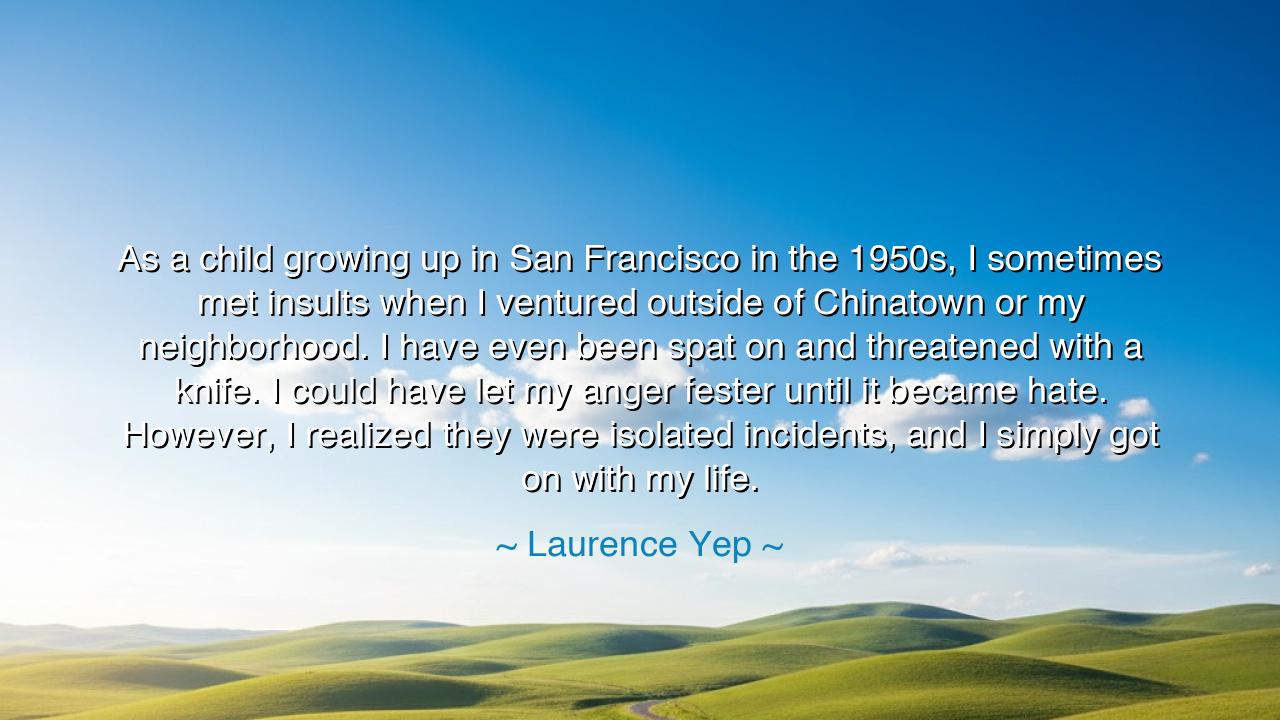
As a child growing up in San Francisco in the 1950s, I sometimes
As a child growing up in San Francisco in the 1950s, I sometimes met insults when I ventured outside of Chinatown or my neighborhood. I have even been spat on and threatened with a knife. I could have let my anger fester until it became hate. However, I realized they were isolated incidents, and I simply got on with my life.






Host: The room feels reflective, with the soft glow of the evening light casting a quiet warmth across the space. Outside, the world continues its usual rhythm, but inside, there’s a sense of contemplation, as though the conversation is about to touch on personal resilience, overcoming adversity, and the power of perspective. Jeeny sits at the table, her fingers lightly tracing the rim of her cup, her expression thoughtful. Jack stands near the window, arms crossed, looking out at the street below.
Jeeny: (her voice gentle, yet filled with curiosity) “You ever think about how we can be faced with hatred or anger in life, but the real choice we have is how we respond to it? How it’s not about letting those moments define us, but about moving past them with grace?”
Jack: (glancing over at her, his voice dry, but intrigued) “Hatred and anger? Yeah, it’s interesting how easy it is to let those emotions take over when faced with cruelty, but it’s also liberating to realize that we have a choice in how we react. What made you think about it?”
Jeeny: (nodding slowly, a small smile forming as she shares her thought) “I was thinking about something Laurence Yep said: ‘As a child growing up in San Francisco in the 1950s, I sometimes met insults when I ventured outside of Chinatown or my neighborhood. I have even been spat on and threatened with a knife. I could have let my anger fester until it became hate. However, I realized they were isolated incidents, and I simply got on with my life.’ It made me reflect on how sometimes, the most powerful thing we can do when faced with hatred is to not let it control us—just to move forward and rise above it.”
Jack: (pauses, considering her words carefully) “So, he’s saying that even though he was faced with real hate and aggression, he didn’t let it define him? Instead of letting it fester, he chose to see those moments as isolated and didn’t let them shape his entire life or mindset?”
Jeeny: (smiling more deeply now, her eyes steady as she explains further) “Exactly. Yep’s point is that while we can’t control what others do or say, we do have the power to control how we respond. He faced real hatred and violence, but instead of allowing those moments to consume him, he chose to move forward with his life. It’s about not letting anger fester and transform into something destructive. It’s about not letting others define who you are or how you live.”
Host: Jeeny’s words seem to settle in the room, creating a shift in the conversation about the power of response and personal resilience. Jack stands still, his expression softening as he processes the deeper message behind Yep’s statement. The world outside continues its rhythm, but inside, the conversation feels rooted in a more profound understanding of how we navigate the challenges of life.
Jack: (his voice quieter now, almost reflective) “I see what he means. It’s easy to get stuck in the anger, to let those negative moments take over, but the real strength is in deciding to move past them. It’s not about denying the hurt—it’s about choosing not to let it control you.”
Jeeny: (nodding slowly, her voice calm, yet filled with quiet strength) “Exactly. The real challenge is not in what happens to us, but in how we decide to respond. We can’t always control others’ actions, but we can control our mindset. By refusing to let anger or hatred take root, we free ourselves to live our lives with peace and purpose.”
Jack: (pauses, a small smile forming on his face as the idea sinks in) “It’s liberating, isn’t it? To realize that we don’t have to let others’ hate or negativity shape who we are. It’s a choice to rise above it and keep moving forward, no matter what comes our way.”
Jeeny: (smiling warmly, her voice gentle, yet filled with wisdom) “Exactly. We all face challenges, and sometimes those challenges come in the form of hate or negativity. But it’s up to us whether we let them define us. The real strength is in not letting those moments take root, in choosing to rise above and continue moving forward.”
Host: The room feels lighter now, as though the conversation has shifted into a deeper understanding of resilience and the power of choosing how we respond to negativity. Jack turns from the window, his posture more relaxed, his thoughts clearly reflecting on the strength that comes from not allowing hate to consume us. Jeeny watches him, content in the realization that true freedom comes from deciding to rise above challenges and move forward with grace. The world outside continues its rhythm, but inside, there’s a shared understanding that the most powerful choice we have is how we respond to the negative moments in life.






AAdministratorAdministrator
Welcome, honored guests. Please leave a comment, we will respond soon